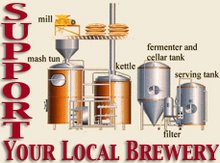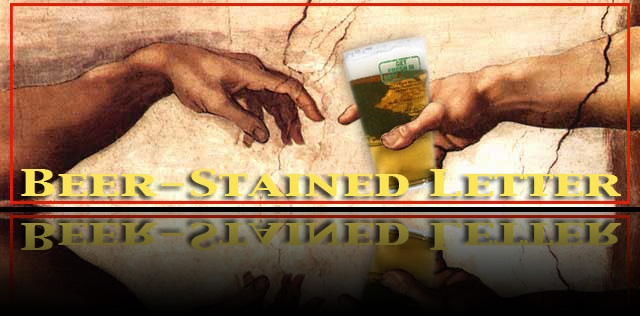 Another production brewery is under development in New Jersey, with hopes of entering the state's craft beer market with a draft brew around Memorial Day.
Another production brewery is under development in New Jersey, with hopes of entering the state's craft beer market with a draft brew around Memorial Day.
Cousins Chris and Augie Carton got the blessing of Atlantic Highlands officials for their planned Carton Brewing Company late last year. They've been spending this month gutting the interior of their building (pictured below) on Washington Avenue in the Monmouth County bayshore town to get it prepped for delivery of brewing equipment.
The equipment from Newlands Systems in Canada – a 15-barrel brewhouse, three 30-barrel fermenters, a 30-barrel bright tank and same-size hot liquor tank – is expected to arrive some time in March. Barring any glitches or delays, the cousins hope to have their state and federal licensing squared away in April so they can launch in time for the summer with a hoppy, kolsch-like beer. That brew could be followed up with a steam beer (working name Carton Common) or an IPA.
 For their brewer, the Cartons have hired Jesse Ferguson, a Brooklyn friend and trusted homebrewer now turning pro after a stint managing the indie hip-hop record label Definitive Jux. Over the holidays, Jesse did some on-the-job training at Terrapin Brewing in Athens, Ga., where his brother-in-law, Bob Weckback, works. For the past couple of weeks, Jesse has been dividing his time between some on-site work in Atlantic Highlands and additional brewery training at Greenpoint Beer Works in Brooklyn. (Pictured at top around their half-barrel test brew kettle is Chris, Jesse and Augie.)
For their brewer, the Cartons have hired Jesse Ferguson, a Brooklyn friend and trusted homebrewer now turning pro after a stint managing the indie hip-hop record label Definitive Jux. Over the holidays, Jesse did some on-the-job training at Terrapin Brewing in Athens, Ga., where his brother-in-law, Bob Weckback, works. For the past couple of weeks, Jesse has been dividing his time between some on-site work in Atlantic Highlands and additional brewery training at Greenpoint Beer Works in Brooklyn. (Pictured at top around their half-barrel test brew kettle is Chris, Jesse and Augie.)
"It's my version of beer school. I'm trying to learn everything I can," he says.
 New Jersey's craft beer scene is enjoying a growth spurt since of late. Iron Hill brewpub opened in 2009 in Maple Shade as the first new Garden State brewery in 10 years. In April 2010, New Jersey Beer Company launched, and last August, Port 44 Brew Pub began turning out its lineup of house ales.
New Jersey's craft beer scene is enjoying a growth spurt since of late. Iron Hill brewpub opened in 2009 in Maple Shade as the first new Garden State brewery in 10 years. In April 2010, New Jersey Beer Company launched, and last August, Port 44 Brew Pub began turning out its lineup of house ales.
By the end of 2010, there were four limited brewery license applications pending before state regulators.
Carton Brewing's development is tracking closely to that of Kane Brewing, which is taking shape about 20 miles south in Ocean Township and also eyeing a potential launch this spring. (Kane and Carton would become the second and third breweries in Monmouth County behind Basil T's brewpub in Red Bank.) And then there's the planned Cape May Brewing in Lower Township, which, like Carton and Kane, also has designs on a spring 2011 launch.
On Saturday, in separate telephone interviews, Chris and Jesse outlined plans for Carton Brewing.
The vision for the brewery goes back two or three years, says Chris, who's an attorney in Newark. (Augie works in finance in Manhattan.) The cousins, both longtime residents of Monmouth County's bayshore, were enjoying some beer (Troeg's Nugget Nectar, Chris recalls) one day, and in some discussion, came to the conclusion that their home state could and should be more of a player in the craft beer scene. Homebrewers themselves, they decided to take matters into their own hands and make the leap into the industry.
Fast forward to now, and Carton Brewing is shaping plans to hit the market initially with a draft beer, self-distributing to regional accounts. In time, packaging could include bottles or cans, with an early preference for cans, Chris says.
As the brewery project moves along, Jesse says, there's a palpable sense of excitement.
 "I was down there (in Atlantic Highlands) yesterday taking some water samples and doing some measuring for the grist mill. I had to pinch myself," he says.
"I was down there (in Atlantic Highlands) yesterday taking some water samples and doing some measuring for the grist mill. I had to pinch myself," he says.
Jesse described the brew they plan to launch with as leaning toward a kolsch but with some hop assertiveness.
"The goal isn't to be a kolsch but to have a kolsch-like quality, with a hoppier profile," he says. "It will be complex enough that craft beer drinkers will know they're getting something special."
(NOTE: Interior shots courtesy of Jesse Ferguson and Carton Brewing.)

















